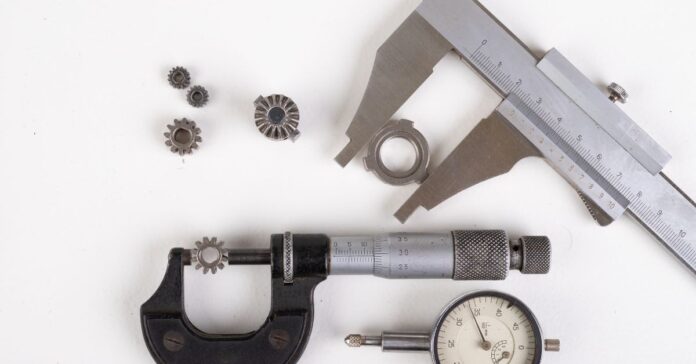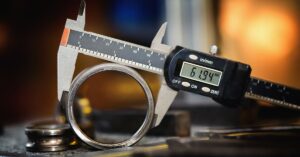Metrology is one such fundamental science supporting many engineering and manufacturing industries for the deliverance of accurate and workable measurements. It ensures accurate, reliable, and standardized measurement to enable industries to ensure quality and efficiency in their processes. This article probes what is metrology is, its importance in engineering and manufacturing, and the tools and software used in metrology.
Understanding Metrology
Metrology, therefore, is the science of measurement, establishing units of measurement and standards of measurement, testing whether measuring instruments are accurate and precise. Measurement is not just about metrology; it is about realizing and understanding uncertainty in measurement and managing uncertainty for improved accuracy.
What is the study of metrology?
Metrology is the science of measurement dealing with the development and application of measuring techniques that provide consistency of measurement through adequate accuracy. For long, it has conventionally been divided into three branches as mentioned below:
Scientific Metrology: Concerns measurement standards and units in general. Advances the measurement science with the aim of international uniformity of measurements.
Industrial metrology is a field of measurement science applied to manufacturing and other processes in industries. In simple words, it means assuring that measurements made in the production processes are appropriate for the determination of product quality.
Legal Metrology: Refers to the regulations that make sure measurements are appropriately fair and used, especially when it comes to trade and commerce.
What is Metrology in Engineering?
Metrology in engineering is indispensable to the design of products and their manufacturing process. It aids the engineer in ensuring that the components are within the specified tolerances and meet precise specifications, thus minimizing errors and waste. Engineering metrology encompasses:
Precision Measurement: Ensuring that components are manufactured within the specified tolerances.
Quality Control: To detect deviations in manufactured products and correct them in order to meet the required quality standards.
Calibration: Periodic calibration of instruments to make sure that measurements remain accurate over time.
What is an Engineering Metrology Laboratory?
Precision measurements are carried out in the metrology laboratory. In general, such laboratories are equipped with advanced measuring instruments and software that guarantee accuracy. The main functions of an engineering metrology laboratory include the following:
Calibration Services: The measuring instruments are checked for their accuracy by comparisons with known standards.
Inspection and Testing: To confirm the dimensional accuracy of parts and components, they are put under inspection and testing.
Research and Development: Development of new measurement techniques and improving already developed techniques.
What is Metrology in Manufacturing?
Metrology in manufacturing has the purpose of ascertaining that parts and products meet the specified dimensions and tolerances, which again is a priority for quality and efficiency. It involves various measurement instruments and technologies, such as coordinate measuring machines or CMMs, laser scanners, and optical measuring devices.
Metrology has the following role in manufacturing:
Process Control: The manufacturing processes are observed to find out any deviation from specifications so that timely corrective action can be taken.
Product Inspection: Quality control inspects the finished products against design specifications for conformance.
Tool Calibration: The accuracy and condition of manufacturing tools are checked.
Main Areas of Metrology
1. Dimensional Metrology
Dimensional metrology deals with the measurement of physical dimensions regarding length, width, height, and angles. It is also very important in industries where high-profile products are concerned; for example, defense and aerospace. The common instruments used in dimensional metrology are micrometers, calipers, and coordinate measuring machines.
2. Industrial Metrology
Application of Industrial Metrology: The use of industrial metrology is considered in manufacturing companies for the accuracy of the measured dimensions on a product. This branch provides assurance to the quality of a product and helps optimize production effectiveness. Industrial metrology encompasses various measurement techniques, tools, state-of-the-art sensors, and inspection systems.
3. Metrology Tools
Metrology tools are those that help one conduct exact measurements. Some commonly used metrology tools are:
Micrometers and Calipers: These are used to measure small dimensions in a very precise manner.
CMMs are utilized in carrying out complex three-dimensional measurements of manufacture. Optical comparators examine small parts against design specifications.
Metrology Software Metrology software plays a major role in the analysis of measurement data and further carries out complex measurements to ensure correct derivation of the inspection results. Software is also necessary in the automation and streamlining of measurement, enhancing the efficiency of inspection. Following are some of the popular metrology software:
PC-DMIS: used by default on CMMs and many other measurement systems for high-end measuring and analysis purposes. PolyWorks: used in 3D metrology, inspection, and reverse engineering. Quite versatile software. CAM2 Measure 10: used in quality control during manufacturing for real-time feedback and analysis.
What is Metrology in Miscellaneous Industries
Metrology is important in several industries, including automotive, aerospace, healthcare, and electronics, due to the assurance given to strict quality standards for performance. Here is how metrology affects those sectors:
Metrology plays a critical role in the healthcare industry, especially in the calibration of medical devices for correct diagnosis and treatment. The electronics industry ensures that at the manufacture of components, precision is observed to ensure functionality in devices. Challenges Facing Metrology Despite being important in everyday life, metrology faces numerous challenges that include:
Uncertainty in Measurement
Ensuring that there is a reduction in uncertainty concerning the measurement being done.
Technological Advancements: Keeping abreast of the evolving technologies and integrating them into the measurement processes.
Competency and Training: It is about building competencies and expertise in manipulating advanced metrology tools and software.
The Future of Metrology
The future for metrology will constantly be pushed by the development of new technologies in the areas of artificial intelligence, machine learning, and automation. Such technologies are expected to bring much precision and speed in measurement, therefore even allowing real-time quality control in manufacturing industries.
Conclusion
Metrology is an indispensable science whose objective primarily contributes to ensuring quality and efficiency across different sectors. From the correctness of the engineering design to the control over manufacturing processes, metrology ensures that measurements are accurate, reliable, and standardized. With the ceaseless development of technology, the field of metrology also changes, making it even more accurate and capable in measurement science.












